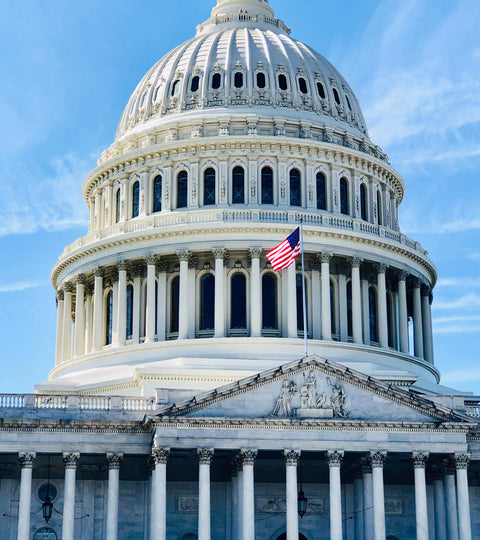Is The United States Ready To Decriminalize Cannabis In 2022?
It’s no secret that the United States has become an increasingly polarized nation. Those who support the Democratic Party and those who support the Republican Party seem to have locked down into separate camps, with little willingness to hear the other side’s point of view.
However, despite the cold civil war that has gripped the U.S., Americans—across all demographics, political or otherwise—are more unified than ever when it comes to one subject: cannabis.
According to the Pew Research Center, 91 percent of Americans believe that medical or recreational cannabis should be legalized.
But will that overwhelming level of support for a reenvisioning of our nation’s cannabis policies translate to the decriminalization of cannabis? And, if so, will it happen soon? Maybe even this year?
The answer, like most aspects of American politics, is complicated…
President Biden: Obstacle-in-Chief
First, let’s start with an analysis of President Joe Biden’s history on cannabis.
Although President Biden professed his support for the decriminalization of cannabis on the campaign trail (and also expungements), he’s hardly been a lifelong proponent of cannabis reform. Biden was one of the sponsors of the 1994 Crime Bill that increased U.S. incarceration rates.
Unfortunately, not much has changed over the years. In 1974, Biden stated that “I don’t think marijuana should be legalized.”
36 years later, there was no mea culpa to catch up with the times. His opinion regarding cannabis in 2010 remained “I think legalization is a mistake.”
In fact, within the first few months of his administration, Biden showed that he has hardly turned over a new leaf and become a champion for cannabis; reports indicate that Biden fired or otherwise burdened numerous staffers whose only indiscretion was prior cannabis use.
Some view President Biden’s choice to avoid seriously engaging with cannabis reform policy in the first year of his administration as a responsible decision, given the fact that we remain in the midst of the COVID-19 pandemic and the importance of meeting other goals, such as on infrastructure. However, it’s likely that Joe Biden will need to see an unrelenting demand for change on this issue from fellow Democratic political leaders and the public in order to budge from his decades-long, cannabis-unfriendly views.
Promising Signs in Congress
While it would be unwise for cannabis activists and enthusiasts to view President Biden as someone who seeks to lead a sea change on American cannabis policies, a good number of Biden’s colleagues in the Democratic Party have been far more active in working to make positive changes happen.
Two politicians who have tirelessly advocated for cannabis reform are Senator Cory Booker (D-NJ) and Senator Elizabeth Warren (D-MA). Booker and Warren have explicitly connected draconian cannabis laws with systemic racism, writing in a joint statement to Attorney General Merrick Garland that “Federal cannabis policy has disproportionately affected the ability of people of color in the United States to vote, to pursue education, and to build intergenerational wealth.”
Senator Booker—along with Senator Ron Wyden (D-OR) and Senator Chuck Schumer (D-NY)—also authored the Cannabis Administration and Opportunity Act. If enacted, this piece of legislation would decriminalize cannabis at the federal level and remove cannabis from the federal list of controlled substances.
The Senate is hardly the only hotspot for cannabis reform in American politics. The House of Representatives has also signaled that a reimagining of cannabis policy may be in the works. One recent victory is the continued advancement of the MORE Act through the House’s committee process. Introduced by Representative Jerrold Nadler (D-NY), the MORE Act would decriminalize cannabis and remove it from the list of scheduled substances under the Controlled Substances Act.
Another possibility for cannabis reform is through potential inclusion in a more wide-ranging bill that touches on a different issue or a mass of other issues. This has already happened in 2021, with cannabis banking reform measures included in a recently passed defense bill.
Alternatives to Congressionally-Approved Legislation
Senators Warren and Booker have not only advocated for cannabis reform in Congress, but also through a different mechanism: requesting that Attorney General Merrick Garland alter how cannabis is scheduled.
There are two different options for Garland to proceed, if he’s so inclined: He can either make the change on his own or he can request a scientific review with the United States Department of Health and Human Services (HHS), which would then need to be approved by the Food and Drug Administration. If Garland chooses the latter option, the secretary of the HHS (Xavier Becerra) could then file a rescheduling petition which would be reviewed by the Attorney General. However, the Drug Enforcement Administration has traditionally fielded such requests.
There are promising signs that Becerra would be open to such a change. Becerra has a strong record on promoting cannabis reform and worked to protect California’s cannabis program from federal interference.
When it comes to Merrick Garland, however, it’s far more of an open question. Garland has acknowledged that there are racial disparities in cannabis enforcement and prosecution. He’s also stated that he doesn’t view people who follow their state laws on cannabis as problematic. But he has deferred to the DEA on issues of this sort in the past. Perhaps, though, Garland may wish to rise to the moment.
One final complication that has previously hindered progress in this respect is the binding nature of international treaties, which is frequently used as a rationale to maintain the status quo on cannabis. However, when perceived as outside of the national interest, the U.S. has backed out of international agreements on other issues before. Perhaps this concern to abide by such treaties will dissipate with enough advocacy from both within our political structure and from voters.
Political Realities
You may have noticed that no Republican has been mentioned up to this point. Although a majority of Republicans do support cannabis reform, their elected officials have yet to get in sync with the majority of their voters.
That said, there is a possibility that we may see some House Republicans in states with legalized cannabis—like Michigan and California—vote for national decriminalization. However, in the more contentious Senate, that’s a less likely occurrence.
Another concern is that Democrats with a more centrist perspective, especially those representing conservative areas like Senator Joe Manchin (D-WV), will remain opposed. In many cases, this is because these areas have been hard hit by the opioid epidemic. While cannabis has been shown to be an effective treatment for pain and opioid addiction, these facts could very well be disregarded for perceived political gain.
We should expect that the bulk of advocacy for cannabis decriminalization will continue to come from the progressive wing of the Democratic Party. This is especially true since Senator Warren and Senator Booker have connected cannabis prohibition with our national conversation about systemic racism.
Conclusion
It’s possible, but unlikely, that we will see cannabis become federally decriminalized in 2022.
Want to learn more about politicians who are in favor of cannabis reform? Why not check out our post featuring quotes from eleven political leaders who want to see major movement in this respect. You can read our article by
.

